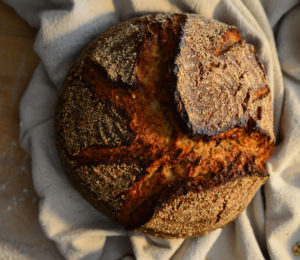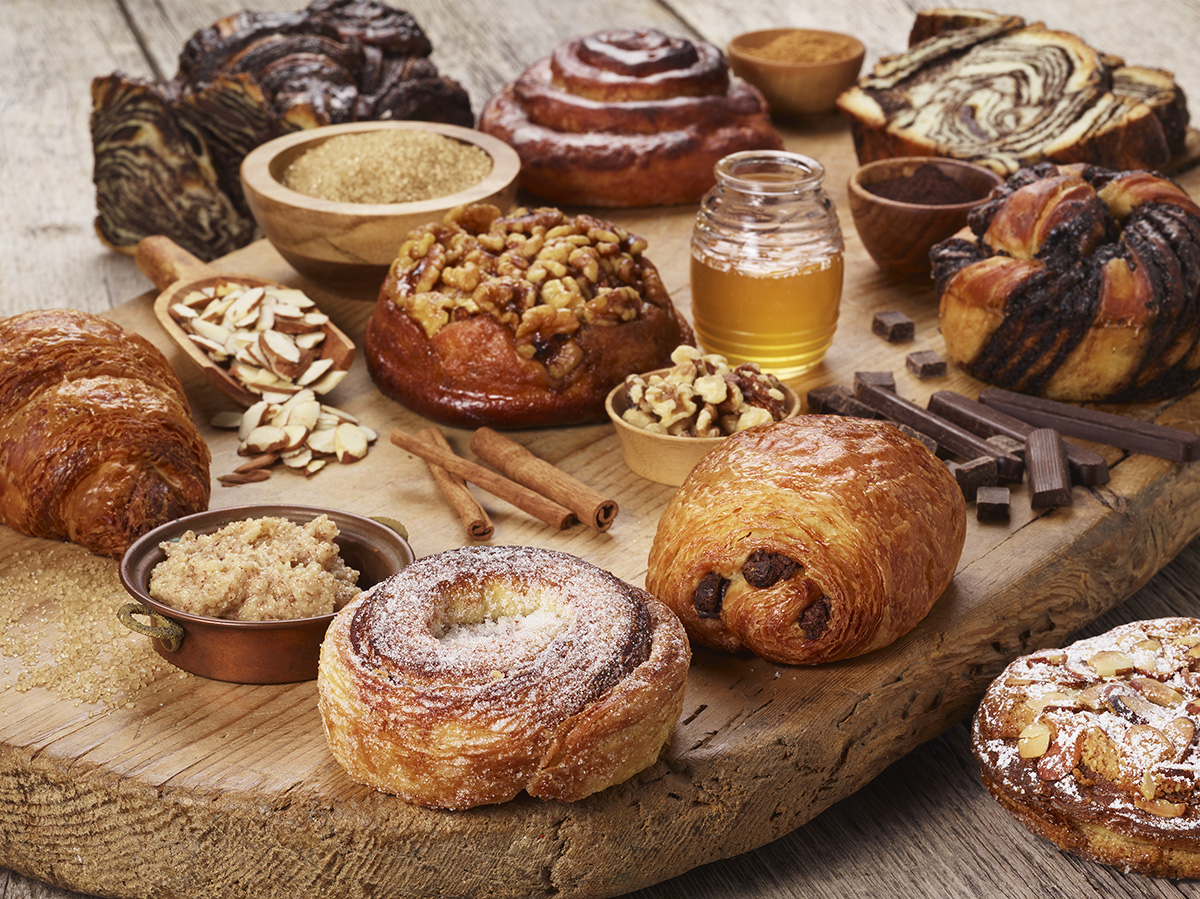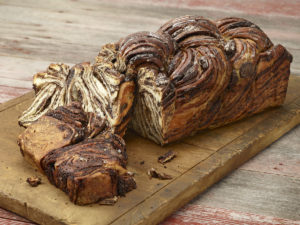What a long, strange COVID-19 trip it’s been for a Golden bakery that is now selling the majority of its baked goods — batards, ciabattas, sticky buns and more — direct to gluten-craving customers instead of wholesaling to local restaurants.
Grateful Bread, run by husband-and-wife Jeff Cleary and Kathy Mullen at 425 Violet St., said this week that it expects to earn most of its revenue from individual customers instead of restaurants. It’ll lean on higher margins and savings on delivery costs to account for its high labor costs, even if overall sales stay down.
Grateful Bread has sold to individual customers for nine years and had done so every Saturday for the past five years, but retail sales numbers have hit all-time highs in recent months after making up just 5 percent of revenue when it launched.
“The demand was huge. The lines were massive,” Mullen said. “We already had huge lines, but had to get them through the door safely.”
Cleary and Mullen said the bakery sold a record 3,300 pieces to about 365 people the weekend before Christmas. Cleary said the business’s retail side doubled in 2020 and added that 30 percent of the bakery’s customers are first-time visitors.
The bakery also fully launched an online store that sells popular items from Fridays at 10 a.m. to Mondays at 10 p.m. late in the year and has offered Thursday afternoon pickups and preorders since Christmas Eve.
In the coming months, the couple hopes to offer baking classes in its newly finished kitchen if COVID-19 case counts fall, saying there’s enough interest to book a year’s worth of classes.
Grateful Bread’s wholesale business will continue, but it’s no longer the business’s bread and butter. The bakery has about three dozen wholesale customers, down from 60 to 70 hotels in years past, and retail sales now make up 55 to 60 percent of the business’s total revenue.

A loaf of Scottish Peat Smoked Barley & Rye made with freshly milled organic rye. (Rachel Adams photo)
The pivot also means the bakery is free from what Cleary and Mullen see as onerous regulations from the Food and Drug Administration, which every few years randomly inspects businesses that generate over half of their revenue as food wholesalers.
If Grateful Bread generates most of its sales from its retail business, it’ll no longer be classified as a food manufacturer and won’t be subject to thorough four-day examinations. Cleary and Mullen said they’ll save money on compliance paperwork, not to mention time, stress and — as improbable as it sounds — teeth.
Mullen said she snapped one of her molars off from constantly gritting her teeth when the FDA last visited the bakery in June 2018.
Refocusing on retail customers should alleviate regulatory headaches while prioritizing the people who helped Grateful Bread through the pandemic. The bakery’s renewed retail focus began last March as wholesale revenue dropped about 85 percent. No longer would there be 30 people crammed in the shop and lines out the door, but it wasn’t because customers were bored of bread.
Mullen scrambled to buy masks, floor decals and other safety supplies to keep customers and employees safe. The bakery gain customers’ support as it gained their trust.
Dozens of restaurants and hotels that were consistent customers for years drastically cut back orders, stopped buying entirely or went belly-up. Early-pandemic expectations that life would return to normal by the summer quickly dampened, and Cleary and Mullen realized the business needed to shift its focus.
“Because of the unknowns, we were trying to focus on how to keep our people employed and how to keep the business going,” Cleary said. “We didn’t know how long the restaurants were going to be shut down.”
Grateful Bread enjoyed its first profitable month since the pandemic in October, as Mullen said it squeaked out a narrow profit of about $800 as it prioritized its direct-to-consumer business. For the first time ever, retail sales surpassed the wholesale side and made up 52 percent of total sales.
But a surge in COVID-19 cases damaged sales, and the bakery has fallen back into the red. A second round of money from the Paycheck Protection Program, which came to businesses with revenue down at least 25 percent year-over-year in the fall, arrived in January and helped the couple stay afloat.
Revenue was 50 percent lower in 2020 than a normal year, and the couple has little guidance on what’s ahead in 2021.
Retail customers are coming out in droves, Cleary said, but he has no way of knowing whether the vaccine rollout will bring booming business back or if cases will climb and lockdowns return. The goal is simply to break even while paying employees and themselves instead of dipping into savings.
“I’ve been doing this a long time in the restaurant business,” Cleary said. “You deal with the good years, and you deal with the bad years. It’s just part of the deal.”
What a long, strange COVID-19 trip it’s been for a Golden bakery that is now selling the majority of its baked goods — batards, ciabattas, sticky buns and more — direct to gluten-craving customers instead of wholesaling to local restaurants.
Grateful Bread, run by husband-and-wife Jeff Cleary and Kathy Mullen at 425 Violet St., said this week that it expects to earn most of its revenue from individual customers instead of restaurants. It’ll lean on higher margins and savings on delivery costs to account for its high labor costs, even if overall sales stay down.
Grateful Bread has sold to individual customers for nine years and had done so every Saturday for the past five years, but retail sales numbers have hit all-time highs in recent months after making up just 5 percent of revenue when it launched.
“The demand was huge. The lines were massive,” Mullen said. “We already had huge lines, but had to get them through the door safely.”
Cleary and Mullen said the bakery sold a record 3,300 pieces to about 365 people the weekend before Christmas. Cleary said the business’s retail side doubled in 2020 and added that 30 percent of the bakery’s customers are first-time visitors.
The bakery also fully launched an online store that sells popular items from Fridays at 10 a.m. to Mondays at 10 p.m. late in the year and has offered Thursday afternoon pickups and preorders since Christmas Eve.
In the coming months, the couple hopes to offer baking classes in its newly finished kitchen if COVID-19 case counts fall, saying there’s enough interest to book a year’s worth of classes.
Grateful Bread’s wholesale business will continue, but it’s no longer the business’s bread and butter. The bakery has about three dozen wholesale customers, down from 60 to 70 hotels in years past, and retail sales now make up 55 to 60 percent of the business’s total revenue.

A loaf of Scottish Peat Smoked Barley & Rye made with freshly milled organic rye. (Rachel Adams photo)
The pivot also means the bakery is free from what Cleary and Mullen see as onerous regulations from the Food and Drug Administration, which every few years randomly inspects businesses that generate over half of their revenue as food wholesalers.
If Grateful Bread generates most of its sales from its retail business, it’ll no longer be classified as a food manufacturer and won’t be subject to thorough four-day examinations. Cleary and Mullen said they’ll save money on compliance paperwork, not to mention time, stress and — as improbable as it sounds — teeth.
Mullen said she snapped one of her molars off from constantly gritting her teeth when the FDA last visited the bakery in June 2018.
Refocusing on retail customers should alleviate regulatory headaches while prioritizing the people who helped Grateful Bread through the pandemic. The bakery’s renewed retail focus began last March as wholesale revenue dropped about 85 percent. No longer would there be 30 people crammed in the shop and lines out the door, but it wasn’t because customers were bored of bread.
Mullen scrambled to buy masks, floor decals and other safety supplies to keep customers and employees safe. The bakery gain customers’ support as it gained their trust.
Dozens of restaurants and hotels that were consistent customers for years drastically cut back orders, stopped buying entirely or went belly-up. Early-pandemic expectations that life would return to normal by the summer quickly dampened, and Cleary and Mullen realized the business needed to shift its focus.
“Because of the unknowns, we were trying to focus on how to keep our people employed and how to keep the business going,” Cleary said. “We didn’t know how long the restaurants were going to be shut down.”
Grateful Bread enjoyed its first profitable month since the pandemic in October, as Mullen said it squeaked out a narrow profit of about $800 as it prioritized its direct-to-consumer business. For the first time ever, retail sales surpassed the wholesale side and made up 52 percent of total sales.
But a surge in COVID-19 cases damaged sales, and the bakery has fallen back into the red. A second round of money from the Paycheck Protection Program, which came to businesses with revenue down at least 25 percent year-over-year in the fall, arrived in January and helped the couple stay afloat.
Revenue was 50 percent lower in 2020 than a normal year, and the couple has little guidance on what’s ahead in 2021.
Retail customers are coming out in droves, Cleary said, but he has no way of knowing whether the vaccine rollout will bring booming business back or if cases will climb and lockdowns return. The goal is simply to break even while paying employees and themselves instead of dipping into savings.
“I’ve been doing this a long time in the restaurant business,” Cleary said. “You deal with the good years, and you deal with the bad years. It’s just part of the deal.”






Leave a Reply